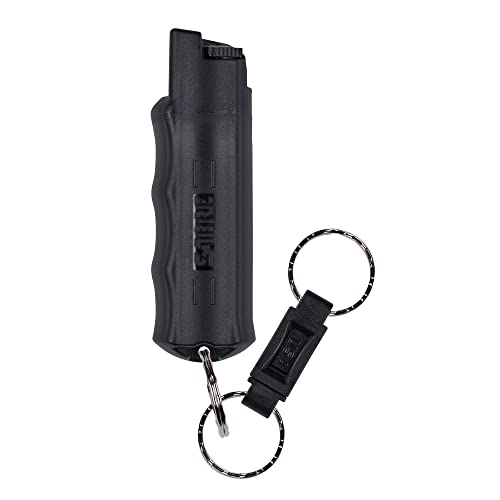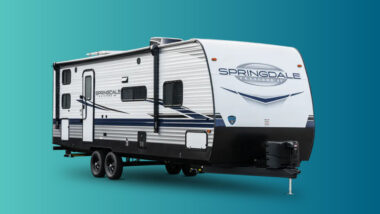Table of Contents Show
If you’ve had the idea of taking a cross-country road trip but are afraid to travel alone, we have some tips for you. Solo RV travel can be life-changing. You can make memories, explore, and learn so much.
So don’t throw away your dream. Embrace the solo RV travel lifestyle, but do so with proper precautions in place. Let’s look at how you can stay safe when traveling alone!
Is Solo RV Travel Popular?
For many younger travelers, hitting the open road in an RV feels thrilling. It’s transformative. It’s challenging. In many instances, going on a road trip feels classic. There’s a sense of nostalgia — like this is the way it used to be.
Solo RV travel, specifically, brings freedom like no other. There’s no one to tell you what to do, no other schedule you have to follow, and no plan other than your own.
Connecting with nature can also provide clarity. The solitude that comes with solo traveling can be therapeutic for many.
But connecting with other travelers along the way can also form unique friendships. Although solo RV travel isn’t for everyone, others feel this calling to adventure independently.
What Are the Advantages of Solo RV Travel?
As mentioned above, traveling alone means there’s no one else to tell you what to do.
No airline company can delay your travels. You don’t have a 2-year-old throwing a temper tantrum who can cause you to leave a roadside attraction. You are in control and have the freedom to go anywhere at any time.
If you want to get up a 5 a.m. and go paddling down a river, you can. If you want to drive into a large city on a Friday night and bar hop, you can. You don’t have to make decisions based on anyone else’s feelings.
Another part of this freedom is spending your budget however you choose. Instead of being on the same page with a spouse, you simply choose where you want to go and for how long.
If you want to spend $250 on a sunset horseback ride, no one will tell you that you should spend that money elsewhere (which may also be a downside).
You can also discover more about yourself through solo RV travel. As you visit different places, you unveil new passions. When you conquer a hike you thought might be too difficult, you learn how strong you are.
After a tire blowout, you understand how to act accordingly and find a solution. All of these examples are part of developing a truer identity and understanding more about yourself.
Through the challenges of solo RV travel, you’ll learn more about yourself and develop stronger problem-solving skills. When the water pump isn’t working, you must figure out if you want water for the weekend.
You can always ask for help, especially at a campground where other RVers may lend a hand, but you may have times when you’ll have to find a solution on your own.
What Are the Disadvantages of Solo RV Travel?
However, along with the freedom of solo RV travel comes loneliness. It can be stressful and challenging some days.
The RV breaks down, a slide malfunctions, or a water pipe leaks. Having to handle all of this on your own can make solo RV travel frustrating.
You may also have days when you’d like to share a beautiful sunrise with someone else or nights you’d like to play a card game with a friend. Depending on how long your camping trip lasts, solo travel can lead to loneliness and homesickness.
Finally, you have safety concerns when traveling alone. For the most part, staying in a campground will provide an added level of security.
However, some solo travelers prefer to hit the road less traveled. Boondocking on public lands is very popular. But being alone in the middle of nowhere can also be dangerous.
If something happens like a tire blowout, and it’s so severe that you can’t change it on your own, what happens if you don’t have cell service? These rural, rugged locations often don’t have the conveniences and amenities of more urban places.
You may find out about your strength, confidence, and courage during these situations, but you also may end up in a sketchy situation.
7 Tips to Stay Safe While Traveling Alone
If you travel alone, you have an adventure ahead of you. Here are some tips to help you stay safe and enjoy the journey.
1. Know How to Operate Your RV
First, before leaving your home, ensure you know how to operate your RV. No one else can do it for you. Thankfully, dealers and manufacturers are only a phone call away if something significant should happen.
But you’ll need to know how to turn on and off the propane, how to run the water pump, how far you need to swing out when turning, and other essential tasks to enjoy your camping adventure.
Take a few practice runs and short one-night trips to ensure you fully understand how to operate your RV.
Pro Tip: Before you hit the road, make sure you check out these Tips for a Smooth Cross-Country Drive!
2. Allow Other Campers to Help
You don’t always have to find a solution on your own. Yes, your problem-solving skills will increase as you travel alone. But there are also times when you need to allow other campers to help.
If you’re having difficulty backing into a tight campsite and a neighbor comes outside and offers to help, appreciate the hand and accept the offer.
If you’re on the side of the road with the hood up and another RVer pulls over, take advantage of their hospitality and allow them to help.
Although you may want to figure things out on your own, identify the other times when it’s okay to ask for and accept the help of others.
3. Invest in an Alarm System and Cameras
One important safety tip for solo RV travel is to spend money on an alarm system. Many options exist, so you must choose what works best for you. But having this security will provide peace of mind. It’ll also deter potential thieves.
Set up a camera outside the entry door. Install motion lights. Do whatever is necessary to feel like your home on wheels is protected while away. And at night, you’ll sleep soundly, knowing you’re also keeping yourself safe.
- 2K Resolution: When it comes to security, the key is in the detail. See exactly what is happening in and around your...
- Detailed Night Vision: View recordings or live footage in crisp clarity, even at night, for a clear view of who are...
4. Carry Pepper Spray At Night
Another safety tip is to always carry pepper spray, especially at night. Pay attention to your surroundings if you’re walking to the bathhouse at 11:45 p.m.
If walking your dog right before bed, be on guard. It’s terrible that we must mention this, but being prepared is much better than the alternative.
- TRUST THE PROFESSIONALS: SABRE is the #1 Pepper Spray brand trusted by police and consumers worldwide, including New...
- 2X STRONGER: 4 out 10 violent crimes involve alcohol use by the offender - our max strength Pepper Spray is strong...
5. If It Feels Wrong, Leave
When you’ve searched Campendium or AllStays and found what you think to be the perfect dry camping spot along a river gorge, you probably can’t wait to get there. However, don’t let ideal planning put you in a dangerous position.
If you get there and you find glass bottles all over the ground or feel like a creepy person is staring at you the whole time, there’s nothing wrong with leaving.
If it doesn’t feel right, get out. No amount of security cameras will rid you of a sinking feeling. Protect your RV and yourself, and find another place to camp.
Keep in Mind: Are you wondering what the most important safety features are to have in your RV? Click the link to find out.
6. Always Carry a First Aid Kit
Before heading out on your solo adventure, ensure you have a substantial first aid kit. Traveling alone brings great freedom, but it also means you’re on your own when something goes awry. Always carry a first aid kit with you — on a hike, bike ride, or wherever your adventure takes you.
Knowing where the closest urgent care center is located is also a good idea. You might not have cell service if you’re boondocking in a remote location. So think about what you would do if an emergency came up.
Hopefully, you never have to use your first aid kit or call for help. But, like with carrying pepper spray, it’s better to be prepared.
- Comprehensive Emergency Kit: Includes adhesive fabric and plastic bandages, antibiotic ointments, BZK antiseptic...
- Convenient Packaging: An ideal workplace and home first aid kit, this basic first aid kit comes in a soft-sided zippered...
7. Make Sure Someone Always Knows Where You’re Camping
Finally, solo travelers should always tell someone where they are. Text a friend and let him know you’ll be hiking an 8-mile trail tomorrow.
Give a friend your travel itinerary if you’re taking a long road trip. And then check in periodically with these friends to let them know you’re safe and enjoying the journey.
What Types of RV Is Best for Solo Travel?
Many solo travelers prefer a simple setup that they can easily handle. Usually, this means buying a motorized RV instead of a towable unit. When traveling alone, having to unhitch and hitch up often can be grueling and tiresome.
Because of its size, a Class B campervan is the most common choice for solo travelers. You don’t need another vehicle to get around. You can drive to the grocery store, visit a national park, or venture downtown in many Class Bs.
Most of these vans don’t have slide-outs, eliminating slide failure. But even with a smaller interior, you have everything you need to enjoy camping. Some units will even have a bathroom of some kind.

Enjoy the Adventure But Stay Safe This Camping Season
If you want to take a road trip or venture out to a few places this camping season and don’t have a traveling partner, don’t cancel your plans or throw away your dream.
As long as you take proper safety measures, you’ll love the freedom of the solo RV travel lifestyle. Imagine all the places you could visit, things you could do, and people you could meet!
Where will your journey take you this camping season?
Last update on 2025-01-02 / Affiliate links / Images from Amazon Product Advertising API









